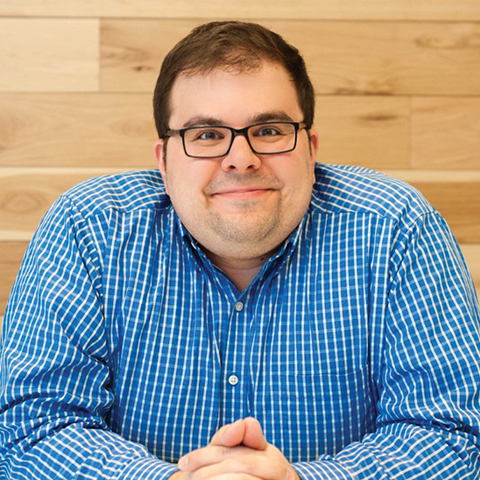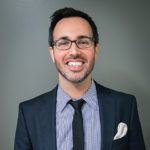
He was serving as general manager of the San Diego Convention Center in 2012 when he decided to launch his own consulting business, and at the same time enrolled in San Diego State University’s newly created master’s program in hospitality and tourism management (HTM).
Shortly after Gessner started the mostly online program, sports and entertainment giant AEG, looking to expand its convention-center portfolio in the United States, recruited Gessner as its vice president of convention centers. The first order of business was to bid on a contract to manage the Los Angeles Convention Center (LACC). And so, just as he was beginning the 13-month HTM program, Gessner was charged with putting together that proposal. The resulting 1,645-page document, which Gessner created with 30 colleagues across several departments, won AEG the contract with LACC — and another with the Hawaii Convention Center. Gessner credits the leadership courses he took as part of the HTM program with helping him pull it off.
I had applied for the graduate program in February of 2012, went through the whole process, took the GRE [Graduate Record Examinations], and you had to do a video for them to review why they should select you. I think I got notified officially [that I was accepted] sometime in April. At that point, I had fully intended to be with the [San Diego] Convention Center probably until retirement. I had no intentions of leaving. I wouldn’t have planned it that way to start a master’s program and go out on my own at the same time, [but due to politics affecting the management of the center] … I ended up leaving the organization in July of 2012.
Then actually I started discussions in September with AEG, and I went to work for them in mid-October. I certainly wouldn’t have taken on a new job, especially one that was as demanding as this one, and work on my master’s, too. I have to admit, there were a couple of times where I wondered if I was going to be able to stick with it given the workload I had here, moving to Los Angeles from San Diego, and the demands of the master’s program.
Honestly, the reason why I decided to get my master’s at 58 years of age was because I’d fallen in love with teaching. I had been asked by Carl Winston [director of the L. Robert Payne School of Hospitality & Tourism Management at San Diego State] to teach a class, probably in 2009, for the undergraduate [HTM program], and so I taught a semester of convention-services management, and I’d been a guest lecturer out there probably four or five times a semester on sustainability, leadership, event management, convention-center management, and I really enjoyed it.
I sat down with Carl probably three years ago and said, “Hey, I’m not ready to retire yet. I’m still fairly young, but at some point I’d love to teach. What do you recommend?” He said, “Well, you have to at least have an advanced degree to teach at the university level. And by the way, we’re trying to get a master’s program approved.” This was several years before he actually got one approved, and he said, “I’ll keep you posted. If you’re interested, this would be the thing to do.” That’s why I did it.
My goal is that, I’ll never retire, but when I slow down, I want to teach. Really, it was a case where I went into this program — and I have told [HTM graduate program director and lecturer] Jeff Campbell and Carl this before — that arrogantly I really thought I probably won’t learn a whole lot, but at least I’ll have the paper that will allow me to teach when I do decide to semi-retire. What I actually found was I learned a hell of a lot in the 13 months that I was a part of this program. It has helped me — which, I had no idea. It wasn’t my initial intent. I didn’t think it would really help me at this point in my career, and I couldn’t have been more wrong.
All 10 classes were great. The ones that probably stick out, there are three. The program really focuses on leadership. Frankly, all of the education that I’d had prior really didn’t teach leadership. They taught you reading, writing, and arithmetic. There was one class, “Leadership Exploration and Theoretical Foundations of Leadership.” There was another one … where you were required to read a book a week and then there were a number of questions, and you had to write essentially a thousand-word paper, or book report, for lack of a better description, on what you learned about leadership from that book. It was [from] those classes that I learned an awful lot about how you lead and how you use leadership skills when you’re leading people that don’t necessarily report to you. In fact, they may be superior to you in an organization. It’s kind of counterintuitive. How could I be leading my boss, or how could I be leading a senior executive team on a project? It may be because you were assigned to it, even though you’re organizationally junior to these people.
The techniques that I learned from those three classes no question helped me, because I was asked to do that very thing on both of these projects that we were bidding on. That is to prepare the proposals for consideration from management for both the Hawaii Convention Center and the Los Angeles Convention Center, and I had to use every resource that AEG corporate had available to them here. None of the people reported to me. I didn’t have any staff. I was a staff of one that entire year, but I had to basically incorporate every single department in helping me develop and write this proposal. I honestly don’t think I could have done it had I not had some of the tools that I was taught in those classes.


